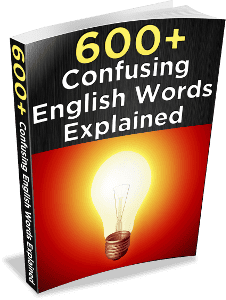When do we use the word incident vs. accident in English? Let’s define “incident” and “accident” so you know the right one to use in each situation!
 This is a free sample from the e-book 600+ Confusing English Words Explained. It will help clear up your doubts about how to use English words correctly, so that you can speak and write more confidently. Click here for more information!
This is a free sample from the e-book 600+ Confusing English Words Explained. It will help clear up your doubts about how to use English words correctly, so that you can speak and write more confidently. Click here for more information!You may hear the words accident and incident to refer to events in the news. These words are easy to confuse, but they are not exactly the same! Incident is more general, and accident is more specific.
Incident: Definition and examples
Incident can refer to any event – big or small, good or bad, intentional or unintentional.
A bank robbery, a funny or controversial situation, an argument between celebrities, etc. – all can be described as incidents.
Accident: Definition and examples
An accident is a bad event caused by error or by chance. Accidents are always unintentional, and they usually result in some damage or injury.
A car crash is one example of an accident. If some equipment malfunctions in a factory and injures the workers, that is also an accident. Examples of very minor accidents are when you step on someone’s foot or spill your coffee on someone else. You didn’t want or plan to do it.
Accident vs. incident
All accidents can ALSO be described as incidents – but NOT all incidents are accidents.
If a drunk driver runs his car into a group of people, that is an accident (he did not intend to do it; it was caused by alcohol and chance). It could also be described as an incident (“The incident occurred on Main Street at around 2:30 AM”).
If three people were arrested after fighting in a bar, that is an incident (but not an accident – because the fight was not by chance; they intended to fight).
Now you know the difference between incident and accident! Can you think of your own example of an incident, and your own example of an accident?
- Learn more confusing words:
